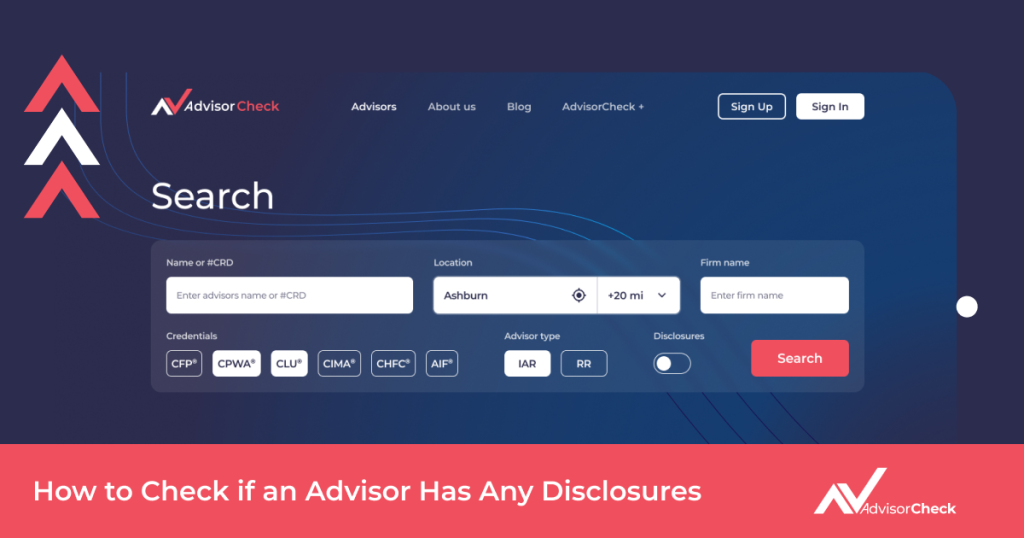Blog

Financial Advisor
Financial Advisor Expungements: What They Are and Why You Need To Know About Them
We are in the spotlight












If you’re in the process of seeking out a reliable, skilled financial advisor, you must do your due diligence in understanding the track records of prospective advisors. Part of investigating that track record is finding out if they have any disclosures and, if so, how serious those disclosures may be. However, there is a complicating factor here: all disclosures may not be included in financial advisors’ records because of the process of expungement. Expungement is defined by Investopedia as “the act of eliminating a formal customer complaint lodged against a securities broker from the Financial Industry Regulatory Authority's (FINRA) public records.” Before we explain more about expungements and why they can be a problem for investors, we’ll provide some necessary background by explaining what the term “disclosure” means. In the context of finance, disclosure takes place when companies publicize any information about themselves that could impact investors’ financial choices. Disclosure should happen within a reasonable timeframe so that investors are not left in the dark unnecessarily. In the United States, the Securities and Exchange Commission (SEC) is in charge of establishing official disclosure requirements, as well as for enforcing these requirements for any companies listed on major U.S. stock exchanges (i.e. the New York Stock Exchange and the Nasdaq). Disclosure is based on the broader legal principle that “all parties should have equal access to the same set of facts in the interest of fairness,” writes Investopedia. All Disclosures Are Not Created Equal There are 187,416 financial advisors that have a disclosure on their record. As of this writing, there are a total of 345,870 disclosures out there. Considering that there are around 630,000 Registered Representatives and around 387,000 Investment Advisor Representatives out there, that is a lot of disclosures to sort through. Keep in mind that disclosures vary significantly in their relevance and severity. Some disclosures are very important to know about, while others are unlikely to have a significant impact on an advisor’s reliability, especially if they have an otherwise strong reputation. That’s why you want to seek out specific details on the nature of a prospective advisor’s disclosures – in order to make an informed decision as to whether or not any elements of their record are a concern for you, or are indicative of a lack of professionalism. What Is a Disclosure?

We all need help getting our finances in order throughout our lifetime.
Look through our database to find the most trustworthy financial advisors in your area.
What Are Expungements?: A Detailed Definition Broadly, the term “expungement” refers to “the process by which a record of criminal conviction is destroyed or sealed from state or federal record.” In the more specific context of financial advising, expungements are official customer complaints about or regulatory actions against advisors that have been cleared from FINRA’s public records. Normally, before being expunged, records of these complaints about securities brokers are kept in the system of the Central Registration Depository (CRD). This allows FINRA to maintain records of brokers’ professional conduct. Why an Investor Would Want to Know About an Expungement Formal records of complaints about and regulatory actions against particular securities brokers are an important source of info for investors. They need to know which advisors they can trust to take care of their money. When these records are expunged, investors lose a source of information that could potentially be useful or significant. As the Public Investors Advocate Bar Association (PIABA) describes this problem in their 2021 study of expungements, “FINRA’s CRD provides critical information about brokers that helps investors make informed decisions about who they allow to manage their life savings.” Purging these records leaves investors less informed and less protected. However, keep in mind that expungements normally happen for less serious transgressions. Judges don’t typically expunge records of serious crimes or of actions that put clients in significant financial jeopardy. As a rule, you can expect that judges will most often expunge the records of relatively minor mistakes. Should You Ask Your Advisor If They Have Any Expungements? The idea of raising this topic might sound more than a little awkward, and you may be worried about coming across as accusatory. However, if your advisor’s history is a significant concern for you and having an honest conversation on the subject would offer peace of mind, it can be worth asking directly. As long as you phrase the question politely, you’re entitled to ask — and likewise, your advisor is entitled not to tell you the answer. It’s up to your advisor whether they disclose that information to you. Is It Hard to Get Records Expunged? You might be surprised by how easy it has been for financial advisors to get their records expunged. In the past (about a decade ago), PIABA analyzed around 1,600 arbitration awards that took place from 2007 to 2011, and found that arbitrators granted brokerage firms and/or brokers approximately 90 percent of their expungement requests. PIABA’s updated 2021 study of expungements showed that arbitrators still grant such requests roughly 90 percent of the time, but now that there is more awareness of the problem, the industry is making a concerted effort to address it. How Less Honest Advisors Could “Game” the Expungements System There are a couple of ways that advisors who are less committed to honesty/transparency have used to get their records expunged: “While this may make it sound like any advisor could go out there and get their record expunged, the system is set up so bad actors are kept at bay,” says Leonard Kim of AdvisorCheck. “For example, if you peruse through our database, you will be able to find records from Bernie Madoff, who was barred from the industry. While someone who does something minor may have their infraction removed, someone who does something as devastating to others like what Madoff did is going to end up following them beyond their own personal lifetime,” Leonard continued. Potential New Expungement Rules In July 2022, FINRA responded to the problems with the expungements system by proposing several amendments that would make winning expungements more challenging. According to Joel Everest and David Hantman of Bressler, Amery & Ross P.C., the most recent proposals include: These proposed amendments would go a long way toward increasing transparency around the issue of expungements. They demonstrate that the industry is committed to improving the process — investors may soon be significantly better protected from deceptive practices. Some Advisors Say Expungements Are Already Too Difficult to Win After the SEC proposed changes to FINRA’s expungement process, many advisors responded that expungement procedures “are already an ‘extraordinary’ remedy that needs no further tightening,” according to an article published in Financial Planning Magazine. In particular, advisors object to the fact that FINRA adds customer complaints of advisor misconduct to their database without making sure the allegations are based in fact. They argue that the reason that about 90 percent of requests for expungement are granted is that so many disclosures are based on completely unfounded allegations “because FINRA places complaints in its public database without subsequent investigation.” All About Expungements

How the Expungement Process Works

Finance behemoths like Bloomberg and the Wall Street Journal make you pay to learn about finance. We share our insights to expand your financial literacy for free.
John O’Bannon, a financial advisor at Diversified Financial Group in West Des Moines, Iowa, summed up many advisors’ perspectives when he wrote of the proposed reforms: “Taking away the only option advisors have to stand against invalid complaints and even broker-dealers that throw the advisor under the bus to save their own hides is infuriating.” So what does this all mean? Should you avoid advisors with expungements and disclosures at all costs? The answer is no, absolutely not. Disclosures and expungements are not necessarily serious or meaningful – we'll give an example to illustrate this. Let’s say your advisor was working during the 2008 financial crisis. Although most clients understood that their investment losses weren’t their advisor’s fault, but were in fact part of a systemic economic crisis, some clients filed complaints against their advisors out of anger or frustration at their misfortune. Since disclosures include records of complaints by clients, you may find quite a few disclosures can be attributed to that situation, which doesn’t reflect any actual mistakes or unethical choices on the part of advisors. In this situation, it would certainly make sense for an advisor try and expunge this unfair and unrepresentative disclosure. Now let’s say you meet with that same financial advisor, and you loved what she could offer you and your family. You appreciated her friendly personality and her ability to simplify things – to make you feel a sense of security about your financial plan. You were also convinced she’s worth hiring by her deep knowledge of tax and estate intricacies, and her ability to rapidly problem solve. But then you find out that she has a disclosure related to a client complaint on her record, which she explains to you was an unfair complaint. Does that disclosure really change how you view the professional sitting in front of you today? Realistically, probably not. That’s why it is so important to understand the context of an advisor’s record, with full transparency – it’s ideal to have as much information as possible to make an informed decision about who to hire, while also assessing an advisor’s character with a reasonable amount of empathy and nuance. It does make sense, however, to monitor an advisor through your working relationship with them, to see if any discrepancies do appear while they are servicing your account. You can even monitor an advisor that you are already working with. If you want to check if a financial advisor has any disclosures on their record, use the AdvisorCheck search tool. It’s a great way to do your due diligence on advisors you’re considering hiring or to learn more about your current advisor’s professional background. AdvisorCheck grants you free access to in-depth background checks on hundreds of thousands of investment advisor representatives (IARs) and registered representatives (RRs), drawing from independent and reliable sources to uncover info you might not even have known you could access. Written by Billy Quirk Fact checked by Luke Jara Reviewed by KJ Kim Keep Disclosures and Expungements in Perspective

How to Check if an Advisor Has Any Disclosures

Your go-to source for:
- Breaking out from living paycheck to paycheck
- Countering inflation with saving hacks
- Saving for your or your kid’s futures
- Turning home ownership from a dream into a reality
Disclosure The information provided in this article was written by the research and analysis team at AdvisorCheck.com to help all consumers in their financial journeys, by providing the resources and the insights to help improve one’s financial health, make it through recessionary and inflationary periods of time, and save their earnings to use them towards building a secure financial future. Unauthorized reproduction or use of this material is strictly prohibited without prior approval. Any parties interested in content syndication, references, interviews, or PR, please contact our marketing team at marketing@aimranalytics.com AdvisorCheck.com is an independent data and analytics company founded on the principles of helping to provide transparency, simplicity, and conflict-free information to all consumers. As an independent company providing conflict-free information, Advisorcheck.com does not participate, engage with, or receive funding from any affiliate marketing programs or services. To become a free AdvisorCheck member, visit advisorcheck.com/signup
Most read
The content of video and blog articles are for informational and entertainment purposes only and do not constitute investment, tax, legal, or financial advice. Always consult with a qualified professional before making any financial decisions. The views expressed are those of the author and do not reflect the opinions or recommendations of any affiliated entities.